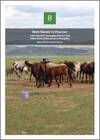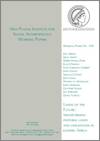This document presents the results of an initiative, begun in 1999, that introduced co-management in four different ecosystems in Mongolia. It was based on the hypothesis that under Mongolian state ownership of pastureland and private ownership of livestock, a co-management system—with clear roles and responsibilities among herders, their communities and local governments—could offer a means to reduce the pasture degradation and overgrazing. The efforts demonstrate that if all stakeholders strongly support co-management it can be a tool to overcome the "tragedy of the commons."
Year of publication: 2014Organization: Unión Internacional para la Conservación de la Naturaleza (IUCN)
Topic: Tierra
Language: English
Type of document: Técnico, Científico
Geographical coverage: Asia Central
Drawing on research from Ethiopia, Kenya, Sudan and Tanzania the paper looks at the significance of pastoralism as a productive economy and the positive bearing it has on the environment, wildlife conservation, and on the health and well-being of pastoral communities. The paper also reflects on what is at stake when one form of land use is replaced by another and when customary rules and practices regarding land access, land use, and traditional law are not fully recognised by policy makers.
Year of publication: 2014Organization: Autores individuales
Topic: Economía, Tierra
Language: English
Type of document: Técnico, Científico
Geographical coverage: África Oriental
This publication presents the availability, access and utilization of crop residues and agro-industrial by-products in West Africa. It contributes to the efforts to strengthen mechanisms to establish and maintain feed assessments in West Africa. National feed assessments in a country build and improve resilience in its livestock production, support the formulation and implementation of livestock policies and programmes for sustainable livestock production, contribute to the use of appropriate feeding strategies, and respond to the impact of floods and drought.
Year of publication: 2014Organization: Organización de las Naciones Unidas para la Alimentación y la Agricultura (FAO)
Topic: Valeur ajoutée
Language: English, Français
Type of document: Técnico
Geographical coverage: África Occidental
This film shows views of pastoralists' representatives on pastoralism as a sustainable form of livelihood. They expressed their views during the Global Pastoralists' Gathering held in Kiserian Kenya from 9th to 15th December 2013.
Year of publication: 2014Organization: Unión Internacional para la Conservación de la Naturaleza (IUCN)
Topic: Organización, Participación
Language: English
Type of document: Videos
Geographical coverage: Global
Ethiopia is one of the 16 countries implementing the Global Financing for Gender Equality programme whose main objective is to increase the volume and effective use of aid and domestic resources to implement national commitments to gender equality and women’s empowerment (GE/WE). This Preliminary Gender Profile was undertaken to provide an indicative status of the level of gender equality in Ethiopia; propose recommendations on key gaps and emerging trends, and propose areas of focus for a comprehensive gender profile.
Year of publication: 2014Organization: Autores individuales
Topic: Género y juventud
Language: English
Type of document: Técnico
Geographical coverage: África Oriental
This article addresses the politics and practices of natural resource rights with a view to environmental justice. Struggles over identity politics at different geographical scales have become important mediators of claims for justice with respect to resource rights. Analyses of identity-based claims for environmental justice have usually focused on the indigenous peoples’ movement. This article focuses on the emerging global pastoralists’ movement. In recent years, mobile pastoralists have begun to carve out new global spaces, through which diverse groups have tried to negotiate common ground and forge common identities in their struggles for justice. They have become increasingly visible in nature conservation politics and in contests over land rights, claiming to be “custodians of the commons” in an era of global climatic change. The paper draws on empirical work amongst pastoralists, NGOs and activists from Kenya, Mongolia and Spain to explore these identities, their implications for resource rights, and the chains of accountability and legitimacy between global activists and local pastoralists.
Year of publication: 2013Organization: Autores individuales
Topic: Servicios ambientales
Language: English
Type of document: Técnico
Geographical coverage: Europa, África Oriental, Asia Central
Diciembre 9-15, 2013: 120 representantes de comunidades pastoriles de 48 países se dieron cita en Kiserian, Kenia, para compartir experiencias e inquietudes sobre la transición a una economía ecológica mundial. El pastoralismo –la producción ganadera extensiva en ecosistemas de pastizal– es uno de los sistemas alimentarios más respetuosos con el medio ambiente del mundo, pero la capacidad para proveer carne, leche y fibra, así como servicios ambientales, tales como la mitigación del cambio climático, la conservación de la biodiversidad y la protección de cuencas hidrográficas, se está erosionando continuamente debido a políticas e inversiones mal concebidas, a la inobservancia de los derechos humanos básicos, y a la interrupción de las prácticas adecuadas de gestión de pastizales, incluida la movilidad.
Year of publication: 2013Organization: Unión Internacional para la Conservación de la Naturaleza (IUCN), Programa de las Naciones Unidas para el Medio Ambiente (UNEP), Comisión Económica para África
Topic: Participación
Language: English, Français, Español
Type of document: Políticas y legislación
Geographical coverage: Global
This policy brief discusses how to best support women’s empowerment and gender equity. It concludes that interventions need to be start with pastoral women themselves. Empowerment is more sustainable when it comes from within. Women’s place and role in the pastoral communities needs to be understood and acknowledged. What empowerment means for pastoral women should influence how this is supported and achieved. The right institutional frameworks and supporting mechanisms are vital to support women’s empowerment.
Year of publication: 2013Organization: , Fondo Internacional de Desarrollo Agrícola (FIDA), Unión Internacional para la Conservación de la Naturaleza (IUCN), Programa de las Naciones Unidas para el Desarrollo (UNDP)
Topic: Género y juventud
Language: English
Type of document: Técnico, Políticas y legislación
Geographical coverage: Global









